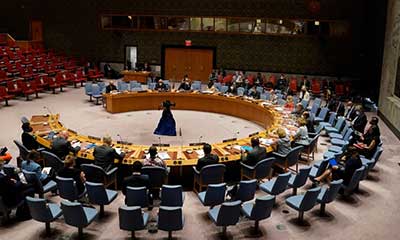Relevance: GS-2: Bilateral, regional and global groupings and agreements involving India and/or affecting India’s interests; Effect of policies and politics of developed and developing countries on India’s interests, Indian diaspora; Important International institutions, agencies and fora- their structure, mandate.
Key Phrases: Russia-Ukraine War, International Organisations, SCO, G20, global financial system, United Nations and its family of institutions, Global power play, Quad.
Why in News?
- Reconstruction efforts after the Russia-Ukraine war will be dominated by the heft of the membership of major nations across international organisations.
Key Points:
- India does not play host to any major global institution nor does it
hold positions of significant influence in the ones in which it has
membership.
- As a result, the world’s sixth largest economy is obliged to follow the rules set by most of them.
-
The SCO Heads of State Council is the supreme SCO body.
-
It shall determine priorities and define major areas of activities of the Organisation, decide upon the fundamental issues of its internal arrangement and functioning and its interaction with other States and international organisations, as well as consider the most topical international issues.
- India, for instance, is keen to secure the chairmanship of the Heads of
State Council of the Shanghai Cooperation Organisation (SCO).
- Analysts compare the role of SCO with that of NATO in Europe.
- Before that, however, there are other prizes, such as India’s chairmanship of the G20 at the end of this year.
- Also at stake are dominant roles in organisations such as the Asian Infrastructure Investment Bank and the New Development Bank, recasting relations in bodies like the International Monetary Fund (IMF) and more.
-
In February, India approved setting up a G20 Secretariat and defined its reporting structures in preparation of taking over the presidency of the grouping of the world's largest economies later this year. The secretariat will be guided by an apex committee headed by the prime minister, and comprising finance minister, home minister, external affairs minister, and a G20 Sherpa.
-
The G20 Secretariat, responsible for the implementation of policy decisions and arrangements needed for the duration of the presidency.
Need:
- The weaponisation of the global financial system to target countries, Indian policy makers feel, make it essential that New Delhi sits in positions of authority at the rule-making bodies that will decide on their future use.
- For various reasons India has a modest presence in the multilateral organisations. Consequently, as of now, experts don’t see much space for India except as a token presence in them, in the reconstruction phase.
- But influential participation in multilateral organisations is becoming more important for major nations as globalisation as a value goes into retreat.
- Global reconstruction after World War II was dominated by the then newly
created international organisations, including not only the United Nations
and its family of institutions, but also the IMF and the World Bank.
- They were soon joined by the specific continent-based development banks like the Asian Development Bank and the African Development Bank.
- How these institutions approached development was guided by which nations held pole positions in each set-up. Voting rights, for instance, became important in this context.
Fig: Principal organs of UN
- Global power play will become more intense once the scale of the
destruction in the Russia-Ukraine conflict becomes clear.
- As of now, Ukraine is bearing the brunt of the physical destruction, but Russia has begun to suffer from the effects of the punishing regime of sanctions.
- As refugees from Ukraine crowd into neighbouring nations, the impact on host economies will start showing.
- There are estimates that nearly 4 million could flee Ukraine.
- The dislocation adds to the impact Covid-19 has had on the global
economy.
- The cost of getting the economies back on the path of growth was just being totted up when this war arrived.
- It is also difficult to estimate in what shape Russia will emerge after
the conflict. Moscow has deep connections with Central Asian nations.
- As those connections will certainly fray, other nations will race to grab the new opportunities.
- The only checks to the race will be the ones coming from the multilateral organisations.
Way Forward:
- India’s strategy has been to develop deep partnerships with a number of countries to gain positions at the high table.
- But this may no longer be a viable option given the emergence of multilateral institutions as places of reckoning in the global power play.
- The creation of the Quadrilateral Security Dialogue (the Quad), in which India is a significant member, and Aukus, the trilateral security pact between Australia, the UK and the US, are two recent examples.
-
Known as the 'Quadrilateral Security Dialogue' (QSD), the Quad is an informal strategic forum comprising four nations, namely -- United States of America (USA), India, Australia and Japan. One of the primary objectives of the Quad is to work for a free, open, prosperous and inclusive Indo-Pacific region.
Source: Business Standard
Mains Question:
Q. Despite its tremendous progress, some ongoing challenges continue to constrain India’s meaningful participation in global governance. Discuss.









